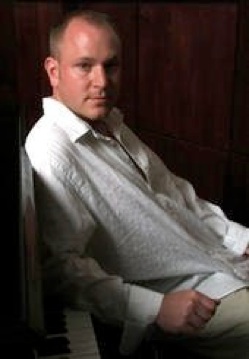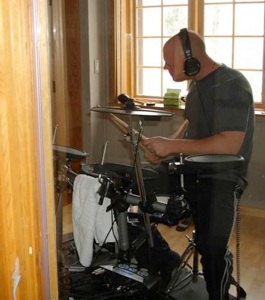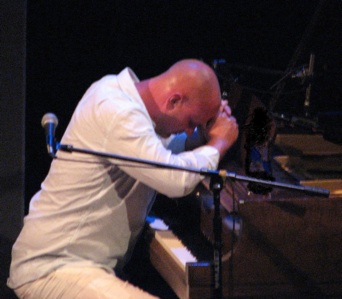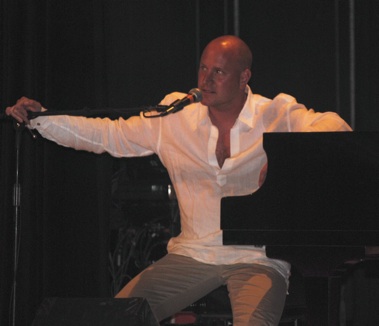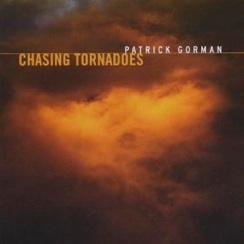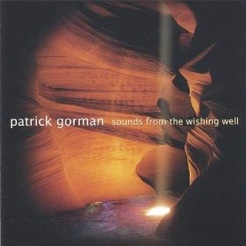When I reviewed Patrick Gorman’s 2005 debut CD,
Sounds From the Wishing Well, I loved the music so much that it made my list of Favorite CDs for that year. Patrick recently released the follow-up,
Chasing Tornadoes, which is even better! A self-taught musician on both piano and drums, Patrick has made it a point to not listen to other pianists and was unaware of Will Ackerman’s long and legendary history when he approached Will to produce his first album. I’m sure you’ll enjoy reading Patrick’s story and getting to know this outstanding artist.
KP: Congratulations on the recent release of Chasing Tornadoes, your second solo piano CD! I already have it on my list as one of the best albums of 2010, and fully expect it to be a finalist on the list like your 2005 debut, Sounds From The Wishing Well was that year.
Patrick Gorman: Thanks so much, Kathy. So happy to hear you have been enjoying the new material. I know it has been a while between albums.
KP: I find it amazing that you consider your primary instrument to be drums when you create such stellar piano music. How can that be?
PG: This is a question that arises frequently. All I can really offer is that the drums and piano, from my own personal perspective, have distinct parallels and don't feel altogether very different. As individual instruments, they lend themselves to various emotions a little differently. I think I have always approached the drums from a melodic place and the piano from a percussive place so it all seems to come together somewhere in the middle.
KP: I know you are a self-taught pianist. Did you teach yourself drums as well?
PG: Yes, I started playing drums when I was about fourteen under slightly unusual circumstances and under a complete veil of secrecy. My older brother (by four years) brought a set of drums into the house unannounced and erected them in his bedroom. I watched as he struggled with opening cymbal stands and mounting the tom onto the bass drum before he sat down and made a wall of noise I had never yet experienced. When he was through, he placed the sticks on top of the snare drum, walked across the room to where I was sitting, and forbade me to ever place so much as a finger on his drums or else physical violence would ensue. So playing drums was pretty much all I did from that day forward! Later that year, he graduated from high school and enlisted in the Navy. Before leaving for boot camp, he sold the drums to a neighborhood friend. I was devastated. The following school year, I saved my lunch money and took up odd jobs to eventually buy them back.
KP: Wow - what an amazing story! Do you play other instruments?
PG: I've spent some time with the guitar, but certainly would not call myself a guitarist by any stretch.
KP: When did you start playing the piano?
PG: When I was sixteen, it became apparent to me that drums were not the most popular instrument to expose a household to on a regular basis. Even after moving them down to the "dungeon” (the dirt floor basement of my parents house, which was riddled with cobwebs and darkness), I still couldn't gain acceptance for banging on them for any length of time. Frustrated with this fact, I began retreating to the small Casio keyboard and headphones which occupied the dining room. When night fell, I would usually sit in there alone and experiment with different sounds.
KP: When did you start composing your own music?
PG: I’m pretty sure I started composing immediately out of a complete and utter lack of ability to play anyone else's music. Initially, I approached the piano like drumsticks with just two fingers, and then over a little time, I began integrating the rest of my hands.
KP: I’ve read that you haven’t heard much “new age” piano outside of your own music. Is that still true?
PG: I have to admit that this is true. It isn't a conscious decision and seems a little strange even to me. I suppose there is a fear of being influenced somewhere in the psychology of that. Growing up with drums, I studied drumming in my own way. I tried to take in and digest everything and everyone from Elvin Jones to Keith Moon to Stephen Perkins to Gene Krupa. I am so incredibly influenced by so many drummers that when it comes to the piano, there is something wonderful, in a creative sense, about exploring that instrument with little direction or an abundance of preconceived ideas about how compositions should be shaped. I understand there is a definitive trade-off in this approach and I am certain that I am missing out on a great deal of wonderful music, but I just feel like this is the best way for me to keep the well pure for now.
KP: Have you done any performing with the Whisperings Solo Piano Radio group?
PG: Yes, I was fortunate enough to participate in a Whisperings concert a couple of years back on Cape Cod along with Gary Girouard, Silvard and David Nevue. I have to say that David Nevue is incredible. What he has done with Whisperings and for the international solo piano community as a whole is astounding. How he manages to make records while accomplishing everything else he does is astonishing. I have heard quite a bit of David's work which is just gorgeous.
KP: David and I have been friends for quite a long time, and it’s been amazing to see how he took the idea of creating a “brand” of solo piano music as well as building a community of pianists and made it happen on a level that I think has gone ‘way beyond what he originally envisioned. One person truly can make a difference!
You recently performed in concert with guitarist/Windham Hill founder/producer Will Ackerman. How did it go?
PG: We played the concert on April 10 at the Whitman Hanson Performing Arts Center here in my hometown of Whitman, MA. The bill consisted of myself, Will Ackerman, Jeff Oster and Luke Vail. It was a beautiful evening. I was so blessed to be able to share a stage with those guys again. They are just incredible.
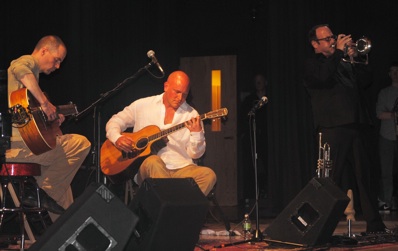
Patrick (center) in concert with Luke Vail & Jeff Oster
KP: I understand that you had never heard of Windham Hill Records or any of the artists who were there when Will Ackerman was. How did you find Will, and why did you choose him to produce both of your albums?
PG: It's true that I had not been familiar with the legacy of Windham Hill or Will Ackerman's history as a label founder, producer or recording artist. Please understand though, that I am now thirty-three years old, and when I was coming up, I was immersed in a different dimension of music altogether. I didn't even give The Beatles a proper listen until I was twenty-two or so, as inconceivable as that might be. I was completely ignorant of so much incredible music that stood outside my very confined musical box in my younger years. I was under the influence of bands and artists like Pixies, Jane’s Addiction, Sonic Youth and PJ Harvey, and did not emerge from that wonderful period for many years.
After an original band I was playing drums for dissolved, I was feeling lost musically. I had recently married my wife and we had our first child. It did not seem justifiable to me to pursue another band and subject my new family to all the baggage that comes with that, such as late night rehearsals a couple of nights a week and gigs in dive bars on the weekends with little compensation to support the time and effort. It just didn't seem right. On a whim, a good friend and previous bandmate suggested I try to do something with the piano music I had been writing but had mostly kept private. After some thought, I took his advice and began searching the internet for studios known for solo piano recordings. Before long, I bumped into Will
Ackerman's site. Having no knowledge of his profound history, I contacted him about recording and somehow managed to convince him to listen to some demos I had worked up. This is when I began to discover just who it was that I was conversing with and I began to panic! I purchased his album Returning and was dumbfounded by the music I was hearing - the emotion, the depth, the dynamics. I had never heard music that embodied such intimacy and the writing just overwhelmed me. He received my package of demos at his hotel in Chicago while he was on the
Windham Hill Winter Solstice tour. Shortly thereafter, we were in the planning stages of making my first record,
Sounds From the Wishing Well (and I was scared to death!).
We banged out the entire record in one day and I left the studio a different musician. Ackerman's history is impressive enough, but it was what he brought to the afternoon - the recording, the performances - that had such a tremendous impact on me. As a producer, he somehow managed to develop a language that I, a scared kid with zero experience, could understand, and he drew from me performances that could never have emerged in any other conceivable way. He has this ability and gift to conjure true depth and expression and then capture it. He knows when it's there and drags it out of you. It was one of the most mesmerizing days I can recall experiencing. I returned home that evening in a complete daze.
When it came time to consider recording my new record,
Chasing Tornadoes, there was no question about who I would ask to produce it. Additionally, Will's Imaginary Road Studios is now home to a Steinway B with a Stanwood action. The piano sounds like heaven.
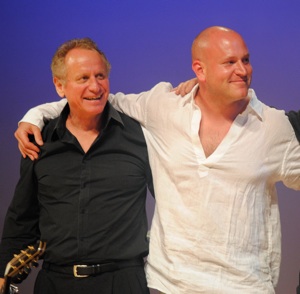
Patrick & Will Ackerman
KP: Sounds From The Wishing Well was recorded in one afternoon. Did you record Chasing Tornadoes that quickly, too?
PG: I gave it a shot, but this one took two sessions.
KP: How much of your music is improvised during a recording session?
PG: The majority of the material is pretty well structured, but I like to include a couple improvised pieces if we can capture something meaningful and memorable. I believe there is a fine line between improvising and noodling so I am careful to not get carried away. I believe three of the twelve tracks on the new record were improvs.
KP: You have been a session musician for some of the other artists who have been recording at Imaginary Road, including as drummer on Fiona Joy Hawkins’ award-winning Blue Dream and Lawrence Blatt’s The Color Of Sunshine. Have you done other session work and has it always been as a drummer?
PG: I have done a bit of session work in smaller local studios here in MA but have also been fortunate enough to do so some work at Imaginary Road Studios in VT the past few years. Drums are without question the instrument I am most fluent with so it seems to lend itself well to other artists’ work. With piano, I am quite limited to mainly composing and I am the first to admit that accompanying others is far from my strong suit.
KP: You also contributed a guitar composition to Jeff Oster’s latest release. How did that come about?
PG: The track, “Violet,” from Jeff Oster's True was more or less an accident. I was alone in a recording studio close to where I live and was allowed to experiment with the various gear and instruments strewn about for the day. I was trying to get a handle on ProTools and began messing around with a guitar composition, layering it with some additional guitar leads. When I was finished, I sent it off to my dear friend Jeff Oster in San Francisco simply because I thought he might enjoy the vibe of the track. Before long, I was informed it was going to be included on his new record. By the time Ackerman, Oster and other players such as Michael Manring, Eugene Friesen and Phil Aaberg were done doing their thing with it, the song emerged as what it is today. My jaw nearly hit the floor the first time I heard it! I was blown away by what those guys had done to this little guitar thing of mine.
KP: They are all awesome musicians!
KP: The photo of you on the back of Chasing Tornadoes is very emotional. What was happening when that picture was taken?
PG: This was a live shot from the Liberty Theatre in Hailey, Idaho. I believe Jeff Oster was playing a beautiful solo introduction to Ramah by Moonlight and I was just taking it in. His playing has this hypnotizing ability reminiscent of a snake charmer. It is difficult to snap out of it once induced.
KP: You work in the field of psychiatric crisis. What does that mean?
PG: I live next to the city of Brockton which can be, in some sections, a pretty unforgiving place. There is a great deal of gang activity, drug consumption, violence, homelessness, etc., as well as a large
number of mentally ill individuals intertwined within that environment. For the past decade, I have worked in both locked facilities and the city emergency room to assist in managing the care and behaviors of those who arrive under circumstances pertaining to what I just described. It certainly isn't a pretty or particularly graceful profession, but it’s one I have a tremendous affection for. Despite the sometimes tragic nature of situations or grittiness and ugliness of an event, there remains something incredibly beautiful about being present and contributing to the moment when someone is the most vulnerable or in the worst possible state. Those suffering from severe addictions and mental illness are often cast aside and treated poorly. Advocating for such individuals when they are unable to do so effectively on their own has been incredibly fulfilling.
KP: Do you find yourself gravitating to the piano or drums to shake off some of the events you deal with at work?
PG: When it comes to blowing off steam and releasing tension it's the drums every time. Wonderful therapy!
KP: You also teach nonviolent self defense. What does that entail?
PG: Given the nature of the patient population, the likelihood for violence is always considerable. I teach a nonviolent self defense program to help coworkers such as the physicians, nurses, social workers, and housekeeping staff keep themselves as safe as possible when confronted with violent and aggressive individuals. So often, people who find themselves in a crisis situation simply freeze and become inactive altogether. This has yet to serve anyone well in my experience, so my main focus is training individuals to develop their own sense of awareness and surroundings and teach effective de-escalation techniques and fundamental self-defense principles that, at the very least, will help to keep them safe until we can get there to assist.
KP: That’s amazing work!
How old are your three children? Are any of them showing any musical interest or aptitude?
PG: My three cherubs, Skyla Blue, KJ and Gracey are seven, six and five years old. I have no idea when that happened and they are just incredible. They play around with instruments, but it is certainly not something that they are pushed towards. If they want to explore, they are welcome to do so. You can't walk into a room of our house without tripping over a drum or guitar or something that makes noise. Skyla Blue does a mean rendition of “Somewhere Over the Rainbow.”
KP: Does she sing it or play it on an instrument?
PG: She plays the song on the piano... beautifully.
KP: What has been your most exciting or moving musical experience?
PG: It is pretty hard to pin down, but I would have to say it was opening the email entitled
YOUR WORK from Will Ackerman after sending off the initial demo to him years ago. It took me ten minutes to open the message as my wife looked over my shoulder. After I read his response, I remember turning to Col and saying, "That's enough for me. It doesn't even matter what happens from here." I was completely overwhelmed by his embracement of the songs.
KP: I can imagine! If you could have any three wishes, what would they be?
PG: Peace, love and happiness.
KP: Who or what are your biggest musical influences?
PG: Well, I have spent the vast majority of this interview discussing Will Ackerman's influence so that's a given. Other influences include Jeff Buckley, The Who, Led Zepplin, George Gershwin, Janes Addiction, Erik Satie, Ween, Sonic Youth, Pixies, Frederic Chopin, Radiohead, Ludwig Van Beethoven, Love and the writings of Hunter S. Thompson, Jack Kerouac, Sylvia Plath, Neal Cassidy, Sun Tzu, Charles Bukowski, Khalil Gabran, and Cormac McCarthy.
KP: That’s certainly a varied group! Is there a particular philosophy that you try to convey in your music?
PG: No. I think the beauty of music is the listener’s interpretation and how it happens to move someone. I have always found music collections with listening instructions and instruction manuals to be strange.
KP: I agree! What’s up next for you?
PG: I never know if I am at the beginning of this thing or near the end. I'll just have to see where it goes.
KP: Is there anything else you’d like to talk about?
PG: No thank you, Kathy. Thank you so much for the opportunity and my best to you as always.
Many thanks to Patrick Gorman for taking the time to do this interview! To learn more about Patrick and to hear samples of his music, please visit
his website, iTunes and Amazon, and be sure to visit his
Artist Page righ here on MainlyPiano
Kathy Parsons
April 2010

